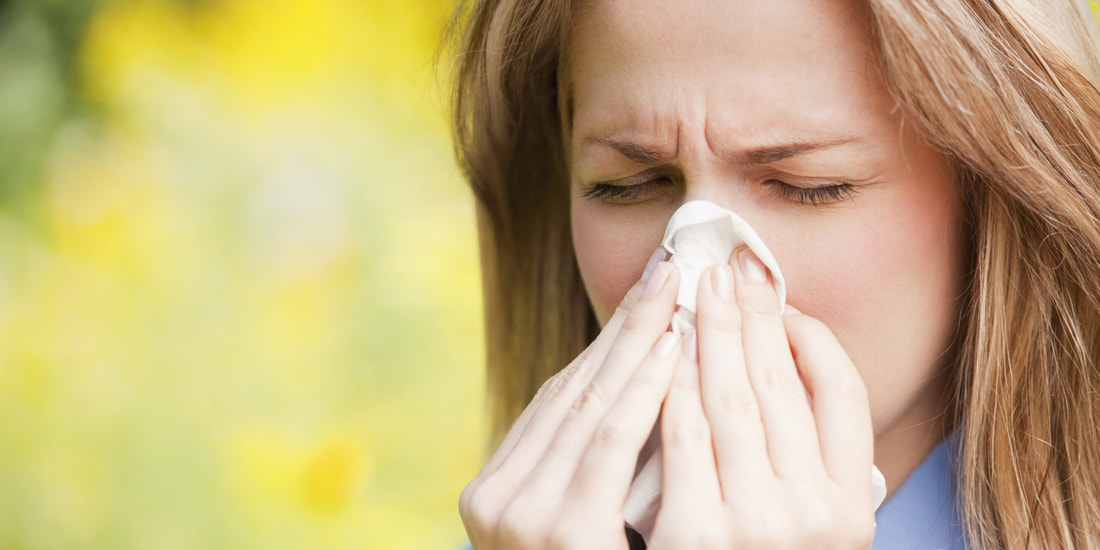|
According to the CDC, more than 50 million Americans suffer from allergies each year. Allergic rhinitis causes symptoms such as sneezing, stuffy or runny nose, watery eyes and itching. Seasonal allergies show up in the spring, summer and/or early fall, and usually involve sensitivity to pollen, grasses, weeds, or airborne mold spores. Alternately, perennial allergies involve year-round symptoms, and generally include sensitivity to house dust mites, animal dander, cockroaches, or mold spores. Acupuncture is a safe, natural alternativeThe most common treatments offered to those suffering from allergies are avoidance of allergens, medication, and immunotherapy (allergy shots). Many allergy sufferers, though, complain that complete avoidance of allergens is not possible and that the medications cause unpleasant side effects, such as drowsiness and dryness of the nasal cavity and mouth. In addition, immunotherapy can have the unintended effect of weakening the immune system. Dissatisfaction with conventional treatment is the main reason that many people turn to acupuncture for help. Unlike medication, acupuncture has no side effects, unless you count the positive ones involving decreased stress and an increased sense of well being. Another side effect of acupuncture is that it strengthens the immune system. Treating the root: the immune systemThe reason that acupuncture treatment is so effective while having positive side effects is that it addresses the root cause of allergies, not just the symptoms. Allergies are caused by a hypersensitivity of the immune system, where the immune system registers as dangerous things that are not inherently harmful to the body. This 'false alarm' causes a huge release of immune resources including histamines into the bloodstream, yielding the symptoms of allergies. By focusing on re-balancing and re-calibrating the immune system, acupuncture addresses the root of the issue, leading to to substantial long-term health benefits and a significant decrease in the symptoms of allergies. Proven effective in numerous studiesIn 2015, a meta-analysis of high quality studies of acupuncture for allergies was published in the American Journal of Rhinology & Allergy. The researchers documented that patients in the acupuncture groups experienced a significant decrease in allergy symptoms compared with the control groups. They also found that acupuncture decreased the requirement for over the counter allergy medication compared with the control groups. In other words, acupuncture has been proven effective for decreasing allergy symptoms and the need for over the counter medication. The biological basis of acupunctureResearchers have also studied the biological mechanisms that make acupuncture effective for treating allergies. One mechanism is the ability of acupuncture to decrease systemic inflammation. Acupuncture has been found to do this in a number of ways. One is by modulating cytokines, which are immune system cell secretions. Acupuncture has been found to reduce the level of pro-inflammatory cytokines and increase the level of anti-inflammatory cytokines. Acupuncture has also been found to have an impact on the hormonal activity of the hypothalamic-pituitary-adrenal axis, increasing the secretion of ACTH and corticosteroids. This has been found to yield reduced swelling of the nasal mucosa. In addition, acupuncture has been found to have an impact on the release of norepinephrine by the sympathetic nervous system, which by connecting to the β-2 receptors on the leukocyte level, also leads to reduced swelling. Acupuncture has also been found to reduce the release of vasoactive intestinal peptide (VIP). This plays a role in the anti-inflammatory effect of inhibiting mast-cell degranulation, preventing excessive vasodilatation and extravasation of the plasma. Links to these studies may be found below. Another impact of acupuncture on allergic reactions is an antihistamine effect. Researchers believe that this is achieved by reducing the signaling of the TRPV1 receptor, which plays an important role in the early allergic response and is responsible for nasal itching and sneezing. Changes in IgE have also been documented as a result of acupuncture treatment for allergies. IgE is a class of immunoglobulins that react to pollen, spores, animal dander and other substances. IgE levels often rise significantly during allergic reactions. A multiphase approachAcupuncturists use a multi-phase approach when treating allergies. While acute symptoms are present, one aspect of treatment focuses on alleviating discomfort. Short term relief is important to patients, and acupuncturists respect this. Another aspect of treatment includes modulating the immune system. In addition, practitioners always treat the underlying problem by tending to the root of the imbalance. The root is discovered through a differential diagnosis that is completed at the first treatment. Additional recommendationsThere are a number of lifestyle shifts that may be helpful in supporting relief of symptoms for those with allergies. These vary by individual, but in general the following may be helpful:
Learn moreAcupuncture is proven effective for allergies in numerous studies. The reason for this is that acupuncture gets to the root of the issue instead of just treating the symptoms. For more information about acupuncture and allergies, see the Resources and Related Links below. For more information about acupuncture, you can read About Acupuncture or take a look at our FAQ. You can also read about Eastern Medicine. If you have any questions, feel free to Contact Us. Or if you'd like to try acupuncture for easing your allergies, you can Schedule an Appointment online. Resources & Related Links
2 Comments
Leave a Reply. |
AuthorMarni Adhikari, M.Ac, L.Ac, Dipl.Ac, is the founder and acupuncturist at Wisdom Traditions Acupuncture of Essex Junction, VT Learn MoreQuestions? |


 RSS Feed
RSS Feed
